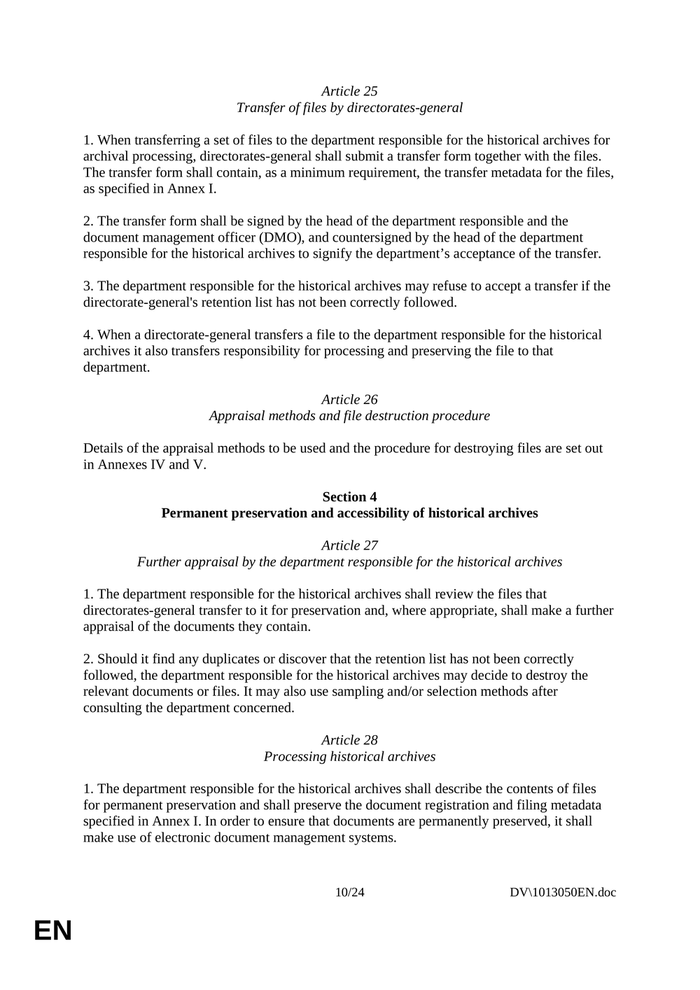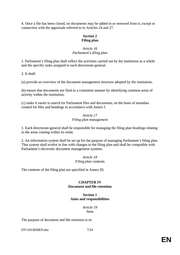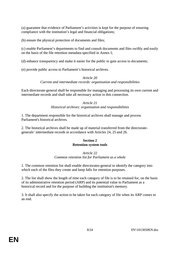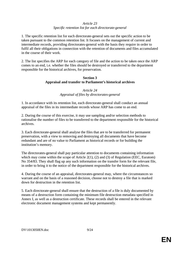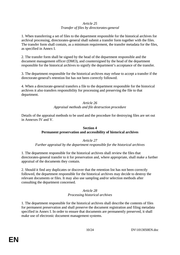4_ep-pe_des20130001_xl.pdf
Dieses Dokument ist Teil der Anfrage „Backup Strategy / Data Retention Audio-visual service“
D(2013)44804 DECISION THE SECRETARY-GENERAL OF THE EUROPEAN PARLIAMENT, HAVING REGARD TO the Bureau decision of 2 July 2012 laying down rules on document management in the European Parliament, in particular Article 12 thereof, HAVING REGARD TO the Bureau decision of 28 November 2001 on public access to European Parliament documents, WHEREAS, with a view to laying down a uniform procedure for processing documents inside Parliament, it is essential for the institution to adopt common rules to be applied by all the departments in the Secretariat; WHEREAS all departments in the Secretariat should play a significant role in applying, coordinating and overseeing the new document management structure; WHEREAS the Guide to the Obligations of Officials and Other Servants of the European Parliament (the Code of Conduct) adopted by the Bureau on 7 July 2008 lays down an openness requirement for the European civil service; WHEREAS Parliament documents must be managed in accordance with requirements including those laid down in: Regulation (EC) No 1049/2001 of the European Parliament and of the Council of 30 May 2001 regarding public access to European Parliament, Council and Commission documents; Regulation (EC) No 45/2001 of the European Parliament and of the Council of 18 December 2000 on the protection of individuals with regard to the processing of personal data and on the free movement of such data; Council Regulation (EEC, Euratom) No 354/83 of 1 February 1983 concerning the opening to the public of the historical archives; Regulation (EU, Euratom) No 966/2012 of the European Parliament and the Council of 25 October 2012 on the financial rules applicable to the general budget of the Union and repealing Council Regulation (EC, Euratom) No 1605/2002; and Regulation (EEC, Euratom, ECSC) No 259/68 of the Council of 29 February 1968 laying down the Staff Regulations of Officials and the Conditions of Employment of Other Servants of the European Communities and instituting special measures temporarily applicable to officials of the Commission (Staff Regulations);

WHEREAS rigorous, standardised document management is fundamental to an effective policy on public access to European Parliament documents based primarily on the electronic register of references (ERR) set up under the Bureau decision of 28 November 2001; WHEREAS documents containing information that may come within the scope of Article 2(1), (2) and (3) of Regulation (EEC, Euratom) No 354/83 require special treatment; WHEREAS this decision lays down general arrangements for document management and is without prejudice to the specific arrangements for the handling of confidential information; HAS ADOPTED THIS DECISION: Article 1 Definition The definition of the term ‘document’ given in Article 2(f) of the Bureau decision of 2 July 2012 laying down rules on the document management in the European Parliament (hereinafter ‘the Bureau Decision’) shall apply for the purposes of this decision. CHAPTER I Registration of documents Article 2 Scope and aims of registration 1. Documents drawn up or received by Parliament's Administration which meet the criteria laid down in Article 3 of the Bureau Decision shall be registered. 2. The aims of registering such documents shall include: (a) formally acknowledging the Administration’s responsibility for the documents, including for legal and financial purposes; (b) enabling the Administration to identify a document without any possibility of error, by linking metadata with the original; (c) certifying that a document has been formally drawn up, i.e. that the author has approved it as ready for forwarding, by either signing it or arranging for its distribution; (d) compiling files on specific matters being dealt with by the Administration, using a consistent and effective filing system; (e) keeping a record of Parliament's activities; DV\1013050EN.doc EN EN

(f) making it easier to allocate a document to a person, a department or a system for action, follow-up, consultation or storage; (g) making documents easier to access and trace throughout their life cycle; (h) enabling Parliament to keep registers containing document references in order to fulfil its obligations, not least under the rules on openness. Article 3 Department responsible for registration 1. Registration shall be performed by the originating department or by the department responsible for taking receipt of the document. 2. When a document is received by a department other than the department responsible for taking receipt of it, that department shall forward the document to the department responsible at the earliest opportunity. Article 4 Registration procedure 1. The department responsible shall analyse each of the documents it formally draws up or receives with a view to determining whether it must be registered in accordance with the requirements laid down in Article 3 of the Bureau Decision. 2. If, under that article, a document must be registered, the department responsible shall register it. It shall save the relevant metadata, as specified in Annex I, and link the document to those metadata in the registration system. The registration system shall assign a unique reference to the document and keep a trace of all of the operations performed in the system. 3. Where necessary, the department responsible shall assign the document a distribution code establishing access rights to it within Parliament. 4. Documents may not be registered more than once. 5. Documents which do not meet the criteria for registration laid down in Article 3 of the Bureau Decision may be saved in a document management system or filed in the appropriate file. Article 5 Making changes to the content of a registered document If changes are made to the content of a document that has been registered, the amended document shall be treated as a new document. The document shall therefore be re-analysed in accordance with Article 4. DV\1013050EN.doc 3/24 EN

Article 6 Correcting registration errors 1. All registration errors shall be corrected and a record shall be kept of the following information: (a) the name of the person making the correction; (b) the date on which it was made; (c) the data that were corrected. 2. This information shall be kept for the same length of time as the document to which it relates. Article 7 Provisional registration Each directorate-general shall lay down procedures enabling it to register documents provisionally in the event of a registration system failure. CHAPTER II Mail handling Article 8 Mail handling objectives Mail entering and leaving Parliament’s premises shall be processed in a manner consistent with Parliament’s policy on information management and internal and external communication. Article 9 Receipt of incoming mail 1. The department responsible for Parliament’s mail shall take receipt of incoming mail at Parliament’s three places of work once the necessary security checks have been completed. 2. Mail addressed to the President, the Secretary-General, the Deputy Secretary-General and committee and delegation chairs, and any mail addressed simply to ‘the European Parliament’, shall be identified and sorted for processing by the department responsible for Parliament’s mail in accordance with Article 10 and Annex II. 3. Mail for addressees other than those listed in paragraph 2 shall be placed in the internal mail for direct distribution to the persons concerned. Mail addressed to Secretariat departments shall be opened and analysed in accordance with Article 4. Should any such mail prove to be for one of the addressees referred to in paragraph 2, the department which 4/24 EN DV\1013050EN.doc

received it shall forward it to the department responsible for Parliament's mail at the earliest opportunity. 4. When an item of mail as referred to in paragraph 2 is received by one of Parliament’s information or liaison offices, it shall be forwarded to the department responsible for Parliament’s mail at the earliest opportunity. 5. Officials and other staff may not have their private mail sent to Parliament. The department responsible for Parliament’s mail may have such mail returned to the sender. 6. The department responsible for Parliament's mail shall be under no obligation to take receipt of unsolicited and unaddressed direct mail. 7. If the identity of an addressee cannot be established because the name is illegible, unknown or incomplete, the department responsible for Parliament’s mail may have the item returned to the sender. It may also take steps to identify the addressee and deliver the item. If it is unable to do so, the item shall be destroyed. Article 10 Dealing with mail covered by Article 9(2) 1. Without prejudice to the mail handling provisions set out in Annex II, the department responsible for Parliament's mail shall open mail covered by Article 9(2). 2. The department responsible for Parliament's mail shall register such mail and either allocate it itself or forward an allocation proposal to the departments responsible. Where necessary, the department responsible for Parliament’s mail shall assign such mail a distribution code establishing the access rights to it within Parliament. 3. By way of exception from Article 15, the department responsible for Parliament’s mail shall forward the originals of such items to the department responsible for the historical archives for centralised storage. Article 11 Processing outgoing mail 1. Outgoing mail shall be processed and submitted to the postal operator by the department responsible for Parliament’s mail. 2. The department responsible for Parliament’s mail shall validate the mail items registered by the sending departments, thus certifying their actual date of despatch. Article 12 Procedures for handling mail in Parliament The procedures for handling mail in Parliament are set out in Annex II. DV\1013050EN.doc 5/24 EN

CHAPTER III Filing Section 1 Filing of documents Article 13 Aims of filing The purpose of this process, which involves departments opening files on the specific matters they are dealing with and organising those files in accordance with the filing plan, as referred to in Article 16, shall be to: (a) make it easier to search for and find documents throughout their life cycle, in particular by creating minimum metadata sets for each file and for the headings in the filing plan in accordance with Annex I; (b) enhance the quality of the work performed by Parliament’s departments and ensure continuity, in particular where responsibility for a given matter passes from one member of staff to another; (c) keep track of work and rationalise the tasks to be carried out by the various departments. Article 14 Opening and closing files 1. A file shall be opened for each matter when work starts on it, and closed once the matter has been dealt with. 2. Departments shall open a file on each matter they are required to deal with under their specific remit. Once the matter has been dealt with, it shall close the file. 3. Each file shall be linked to the relevant heading in the filing plan. Article 15 File integrity 1. All documents that have been registered shall be filed by the department responsible in accordance with Article 14(2). 2. Documents that have not been registered may be included in files in order to provide a more comprehensive overview of the matter at hand. Such documents shall become an integral part of the file in which they have been included when the file is closed. 3. Each department shall ensure that the files for which it is responsible are complete. It shall check that all key items are present. 6/24 EN DV\1013050EN.doc

4. Once a file has been closed, no documents may be added to or removed from it, except in connection with the appraisals referred to in Articles 24 and 27. Section 2 Filing plan Article 16 Parliament’s filing plan 1. Parliament’s filing plan shall reflect the activities carried out by the institution as a whole and the specific tasks assigned to each directorate-general. 2. It shall: (a) provide an overview of the document management structure adopted by the institution; (b) ensure that documents are filed in a consistent manner by identifying common areas of activity within the institution; (c) make it easier to search for Parliament files and documents, on the basis of metadata created for files and headings in accordance with Annex I. Article 17 Filing plan management 1. Each directorate-general shall be responsible for managing the filing plan headings relating to the areas coming within its remit. 2. An information system shall be set up for the purpose of managing Parliament’s filing plan. That system shall evolve in line with changes to the filing plan and shall be compatible with Parliament’s electronic document management systems. Article 18 Filing plan contents The contents of the filing plan are specified in Annex III. CHAPTER IV Document and file retention Section 1 Aims and responsibilities Article 19 Aims The purpose of document and file retention is to: DV\1013050EN.doc 7/24 EN

(a) guarantee that evidence of Parliament’s activities is kept for the purpose of ensuring compliance with the institution’s legal and financial obligations; (b) ensure the physical protection of documents and files; (c) enable Parliament’s departments to find and consult documents and files swiftly and easily on the basis of the file retention metadata specified in Annex I; (d) enhance transparency and make it easier for the public to gain access to documents; (e) provide public access to Parliament’s historical archives. Article 20 Current and intermediate records: organisation and responsibilities Each directorate-general shall be responsible for managing and processing its own current and intermediate records and shall take all necessary action in this connection. Article 21 Historical archives: organisation and responsibilities 1. The department responsible for the historical archives shall manage and process Parliament's historical archives. 2. The historical archives shall be made up of material transferred from the directorate- generals’ intermediate records in accordance with Articles 24, 25 and 26. Section 2 Retention system tools Article 22 Common retention list for Parliament as a whole 1. The common retention list shall enable directorates-general to identify the category into which each of the files they create and keep falls for retention purposes. 2. The list shall show the length of time each category of file is to be retained for, on the basis of its administrative retention period (ARP) and its potential value to Parliament as a historical record and for the purpose of building the institution's memory. 3. It shall also specify the action to be taken for each category of file when its ARP comes to an end. 8/24 EN DV\1013050EN.doc
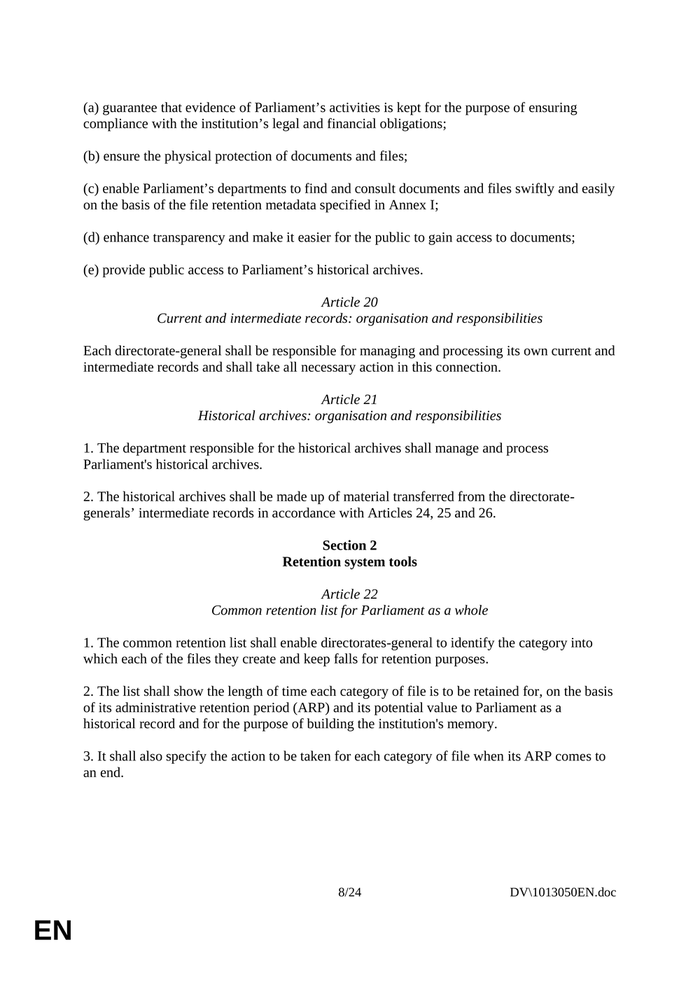
Article 23 Specific retention list for each directorate-general 1. The specific retention list for each directorate-general sets out the specific action to be taken pursuant to the common retention list. It focuses on the management of current and intermediate records, providing directorates-general with the basis they require in order to fulfil all their obligations in connection with the retention of documents and files accumulated in the course of their work. 2. The list specifies the ARP for each category of file and the action to be taken once the ARP comes to an end, i.e. whether the files should be destroyed or transferred to the department responsible for the historical archives, for preservation. Section 3 Appraisal and transfer to Parliament’s historical archives Article 24 Appraisal of files by directorates-general 1. In accordance with its retention list, each directorate-general shall conduct an annual appraisal of the files in its intermediate records whose ARP has come to an end. 2. During the course of this exercise, it may use sampling and/or selection methods to rationalise the number of files to be transferred to the department responsible for the historical archives. 3. Each directorate-general shall analyse the files that are to be transferred for permanent preservation, with a view to removing and destroying all documents that have become redundant and are of no value to Parliament as historical records or for building the institution’s memory. The directorates-general shall pay particular attention to documents containing information which may come within the scope of Article 2(1), (2) and (3) of Regulation (EEC, Euratom) No 354/83. They shall flag up any such information on the transfer form for the relevant file, in order to bring it to the notice of the department responsible for the historical archives. 4. During the course of an appraisal, directorates-general may, where the circumstances so warrant and on the basis of a reasoned decision, choose not to destroy a file that is marked down for destruction in the retention list. 5. Each directorate-general shall ensure that the destruction of a file is duly documented by means of a destruction form containing the minimum file destruction metadata specified in Annex I, as well as a destruction certificate. These records shall be entered in the relevant electronic document management systems and kept permanently. DV\1013050EN.doc 9/24 EN
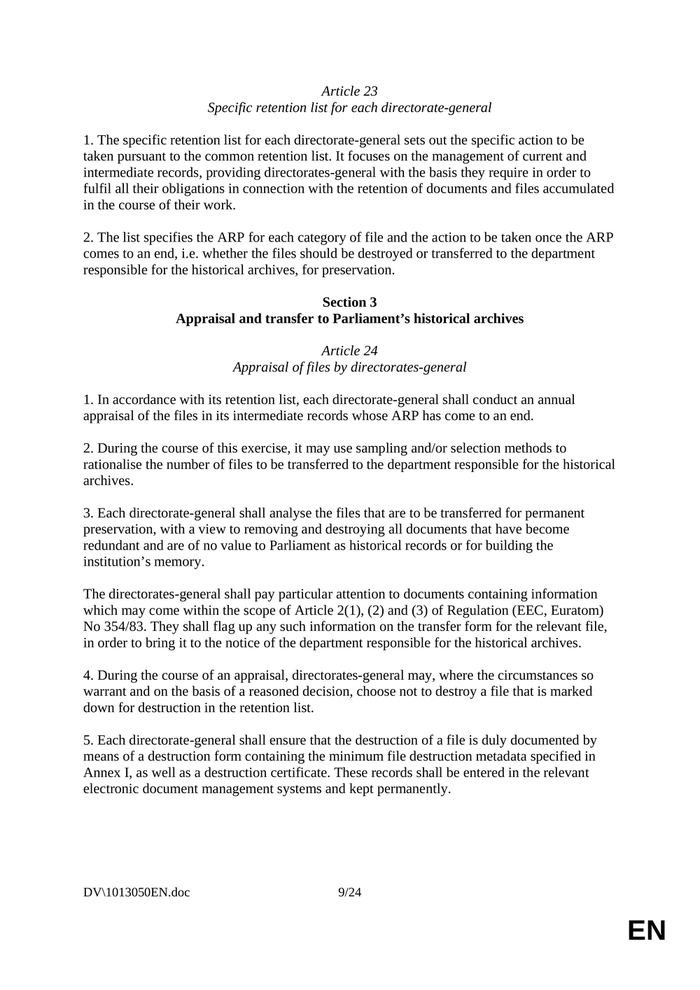
Article 25 Transfer of files by directorates-general 1. When transferring a set of files to the department responsible for the historical archives for archival processing, directorates-general shall submit a transfer form together with the files. The transfer form shall contain, as a minimum requirement, the transfer metadata for the files, as specified in Annex I. 2. The transfer form shall be signed by the head of the department responsible and the document management officer (DMO), and countersigned by the head of the department responsible for the historical archives to signify the department’s acceptance of the transfer. 3. The department responsible for the historical archives may refuse to accept a transfer if the directorate-general's retention list has not been correctly followed. 4. When a directorate-general transfers a file to the department responsible for the historical archives it also transfers responsibility for processing and preserving the file to that department. Article 26 Appraisal methods and file destruction procedure Details of the appraisal methods to be used and the procedure for destroying files are set out in Annexes IV and V. Section 4 Permanent preservation and accessibility of historical archives Article 27 Further appraisal by the department responsible for the historical archives 1. The department responsible for the historical archives shall review the files that directorates-general transfer to it for preservation and, where appropriate, shall make a further appraisal of the documents they contain. 2. Should it find any duplicates or discover that the retention list has not been correctly followed, the department responsible for the historical archives may decide to destroy the relevant documents or files. It may also use sampling and/or selection methods after consulting the department concerned. Article 28 Processing historical archives 1. The department responsible for the historical archives shall describe the contents of files for permanent preservation and shall preserve the document registration and filing metadata specified in Annex I. In order to ensure that documents are permanently preserved, it shall make use of electronic document management systems. 10/24 EN DV\1013050EN.doc
